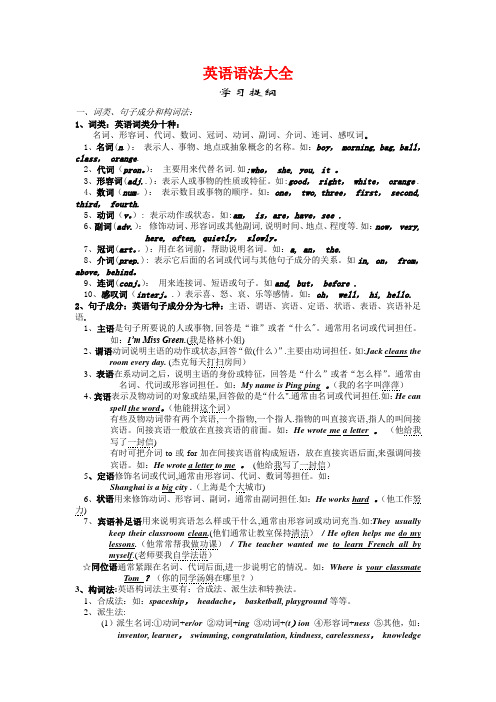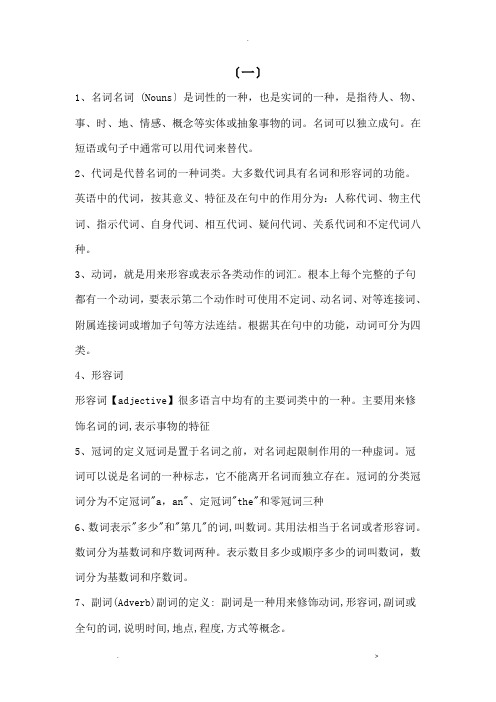写作常用的介词连词副词
英语文法基础:名词、动词、形容词、副词、介词、连词、代词的定义

英语文法基础:名词、动词、形容词、副词、介词、连词、代
词的定义
1. 名词:包括专有名词、普通名词和集合名词,需要注意可数名词与不可数名词,以及存在复数形式变化。
2. 动词:包括动词原形、过去式、过去分词和现在分词。
需要注意谓语动词的人称和数的变化,以及不规则动词的变化。
3. 形容词:常用的有级形容词、比较级形容词和最高级形容词。
需要注意其定义词语和搭配用法。
4. 副词:修饰动词、形容词或其他副词,常用来表达时间、程度、频率等。
需要注意副词的正确使用和搭配。
5. 介词:表示位置、方向和关系的词语,常见的有基本介词和固定短语介词。
需要注意其正确使用方法。
6. 连词:用于连接句子成分的词语,常见的有并列连词、因果连词和递进连词等。
需要注意其紧凑表达的特点。
7. 代词:用于替换名词和代替句子成分的词语,常见的有人称代词、物主代词和指示代词等。
需要注意其正确使用及变化形式。
另外,除了上述的词汇基础以外,还要注意句子的结构,加强语法的理解和运用,例如:
1. 动宾关系:主动词一般和及物动词相搭配,主表结构中的主语一般跟谓语动词构成谓语,而被动词则需要搭配助动词be。
2. 时态:掌握各个时态的正确使用和选择,并能熟练运用它们。
3. 从句:包括主语从句、宾语从句、表语从句和同位语从句等,需要注意语序和连接词的选择。
4. 语气:根据句子的不同结构,采用不同语气来表达,例如祈使句是用来做命令性指示的,因此要用肯定语气。
雅思写作语法大全

英语语法大全学习提纲一、词类、句子成分和构词法:1、词类:英语词类分十种:名词、形容词、代词、数词、冠词、动词、副词、介词、连词、感叹词。
1、名词(n.):表示人、事物、地点或抽象概念的名称。
如:boy, morning, bag, ball,class, orange.2、代词(pron。
):主要用来代替名词.如:who, she, you, it 。
3、形容词(adj..):表示人或事物的性质或特征。
如:good, right, white, orange .4、数词(num。
):表示数目或事物的顺序。
如:one, two, three, first, second, third, fourth.5、动词(v。
): 表示动作或状态。
如:am, is,are,have,see .6、副词(adv.):修饰动词、形容词或其他副词,说明时间、地点、程度等.如:now, very,here, often, quietly, slowly。
7、冠词(art。
):用在名词前,帮助说明名词。
如:a, an, the.8、介词(prep.): 表示它后面的名词或代词与其他句子成分的关系。
如in, on, from,above, behind。
9、连词(conj。
):用来连接词、短语或句子。
如and, but, before .10、感叹词(interj。
.)表示喜、怒、哀、乐等感情。
如:oh, well, hi, hello. 2、句子成分:英语句子成分分为七种:主语、谓语、宾语、定语、状语、表语、宾语补足语.1、主语是句子所要说的人或事物,回答是“谁”或者“什么"。
通常用名词或代词担任。
如:I’m Miss Green.(我是格林小姐)2、谓语动词说明主语的动作或状态,回答“做(什么)”.主要由动词担任。
如:Jack cleans theroom every day. (杰克每天打扫房间)3、表语在系动词之后,说明主语的身份或特征,回答是“什么”或者“怎么样”。
公文写作常用词汇解释及用法

公文写作常用词汇解释及用法一、动词类1. 表示“抓”:“抓住”:指用手或其他方式紧紧地握住或把握住。
例如:“抓住机会”“抓住重点”。
“抓紧”:强调紧紧地抓住并充分利用时间或机会。
如:“抓紧时间学习”“抓紧完成任务”。
“抓好”:表示做好、管理好。
比如:“抓好安全生产工作”。
“抓出成效”:意为通过抓的动作达到显著的效果。
例如:“这项工作要抓出成效”。
2. 表示“推进”:“推进”:推动工作、事业等向前发展。
如:“推进改革进程”。
“推动”:使事物前进。
例如:“推动经济发展”。
“促进”:促使前进,加快发展。
“促进贸易往来”。
“促使”:推动使达到一定目的。
比如:“促使双方达成协议”。
3. 表示“落实”:“落实”:使计划、措施、政策等得以实现。
如:“落实政策”。
“贯彻”:彻底地实现或体现。
例如:“贯彻方针”。
“执行”:实施,实行。
比如:“执行命令”。
“施行”:按照某种方式或办法去做。
“施行新的法规”。
4. 表示“加强”:“加强”:使变得更强和更有效。
例如:“加强管理”。
“强化”:增强,加强。
如:“强化训练”。
“增强”:增进,加强。
比如:“增强体质”。
“增进”:增加并促进。
“增进友谊”。
5. 表示“完善”:“完善”:使完备美好。
例如:“完善制度”。
“健全”:使完备,身体健康而无缺陷。
如:“健全法制”。
“优化”:采取一定措施使变得优秀。
比如:“优化流程”。
“改进”:改变旧有情况,使有所进步。
“改进工作方法”。
6. 表示“建立”:“建立”:开始成立,开始产生。
例如:“建立新的关系”。
“构建”:建立(多用于抽象事物)。
如:“构建和谐社会”。
“设立”:成立,设置。
比如:“设立机构”。
“制订”:创制拟定。
“制订工作计划”。
7. 表示“注重”:“注重”:重视。
例如:“注重细节”。
“重视”:认为重要而认真对待。
如:“重视教育”。
“关注”:关心重视。
比如:“关注民生”。
“关心”:把人或事物常放在心上,重视和爱护。
“关心员工生活”。
写作文常用关连词

写作文常用关连词表示时间关系:first, second, then, finally/at last/in the end , soon immediately, suddenly, at the same time, meanwhile, recently表示对称顺序关系:for one thing….. for the other thing, on one hand,…..on the otherhand,above all, first of all, firstly, secondly, next, finally,theformer….the latter,表示递进关系:what is more, as well, moreover,besides ,furthermore, in addition,what's worse表示换一种方式表达:in other words ,that is to say,表示举例说明:for example, like, such as, for instance 表示陈述事实:in fact ,actually, as a matter of fact, to tell you the truth表示总结:on the whole, in a word, to sum up, in short, in conclusion, from what I have said above表示因果关系:as a result ,thus, therefore, so that, as, because, consequently,表示转折:but, however, while, instead, although, different from, not only ..but also表达自己的观点:in my opinion, personally, as far as I know, I believe, I think, as we all know ,It is known to us all that…。
英语之中名词、代词、动词、形容词、冠词、数词、副词、介词、连词、感叹词

〔一〕1、名词名词 (Nouns〕是词性的一种,也是实词的一种,是指待人、物、事、时、地、情感、概念等实体或抽象事物的词。
名词可以独立成句。
在短语或句子中通常可以用代词来替代。
2、代词是代替名词的一种词类。
大多数代词具有名词和形容词的功能。
英语中的代词,按其意义、特征及在句中的作用分为:人称代词、物主代词、指示代词、自身代词、相互代词、疑问代词、关系代词和不定代词八种。
3、动词,就是用来形容或表示各类动作的词汇。
根本上每个完整的子句都有一个动词,要表示第二个动作时可使用不定词、动名词、对等连接词、附属连接词或增加子句等方法连结。
根据其在句中的功能,动词可分为四类。
4、形容词形容词【adjective】很多语言中均有的主要词类中的一种。
主要用来修饰名词的词,表示事物的特征5、冠词的定义冠词是置于名词之前,对名词起限制作用的一种虚词。
冠词可以说是名词的一种标志,它不能离开名词而独立存在。
冠词的分类冠词分为不定冠词"a,an"、定冠词"the"和零冠词三种6、数词表示"多少"和"第几"的词,叫数词。
其用法相当于名词或者形容词。
数词分为基数词和序数词两种。
表示数目多少或顺序多少的词叫数词,数词分为基数词和序数词。
7、副词(Adverb)副词的定义: 副词是一种用来修饰动词,形容词,副词或全句的词,说明时间,地点,程度,方式等概念。
8、介词的定义和特征介词是一种用来表示词与词, 词与句之间的关系的词。
在句中不能单独作句字成分。
介词后面一般有名词代词或相当于名词的其他词类,短语或从句作它的宾语。
〔二〕1、名词,人或事物的名称3、代词,代替名词或者数词〔比方some就是代替数目〕3、动词,动作或状态4、数词,表示数目或顺序〔比方序数词,5th就是表示顺序〕5、形容词,人或事物的性质或状态〔因为形容词一般修饰名词〕6、副词,动作的特征或性状特征〔因为副词一般修饰动词或形容词〕7、冠词,表示名词的泛指或特指8、介词,表示名词或代词与其他词的关系〔因为介词后面一半紧跟名词,代词或其他名词性构造〕9、连词,连接词与词,短语与短语,句子与句子10、感慨词,表示说话时的感情或语气〔三〕1、adj. / a. 形容词用来描述一类物质的性质,状态,外貌,或人的性格特点,性质,品格如:big,happy2、adv. / ad. 副词用来修饰动作或形容词,一般在句子中做状语用表示动作的进展怎样,或表示程度,特点,如:clearly,happily3、prep. 介词连接地点,时间的一类词语,可以表示方位,时间.跟一些表示时间,地点的词连用表示介词词组如:in,to,on,under4、conj. 连词用来连接时间,地点,原因,结果的一类词语如:when,beacuse,so5、num. 数词表示数字的词,既可以是基数词,也可以是序数词如:one,two,first6、int. 感慨词表示感慨的一类词,一般不加一解释,只代表感慨如:what,how,haurray7、vt. 及物动词〔后面要加宾语〕行为动作的词如:do,finish,play8、vi. 不及物动词〔后面不加宾语〕表示行为动作的词如:appear9、n. 名词表示物体,物质的词如:pig,cow,man10、pron. 代词代指一类人,事或物的词如:he,she,hers,his,things11、art = 冠词,article的缩写〔四〕在英语语法中主要把词分为8大类:1.名词:表示人、物或地方等,如:John,teacher;table,pen;London;beauty.2.代词:用来代替名词,以防止重复*个名词,如:I,you,it,that,those,them.3.形容词:用来修饰或限制*个〔些〕名词,如:good〔man〕,white〔paper〕,every〔book〕,much〔water〕,〔John is〕hon-est,〔He seems〕lazy.被修饰或限制的名词,叫做主体词〔head-word〕。
英语之中名词、代词、动词、形容词、冠词、数词、副词、介词、连词、感叹词之欧阳术创编

1、名词名词(Nouns)是词性的一种,也是实词的一种,是指待人、物、事、时、地、情感、概念等实体或抽象事物的词。
名词可以独立成句。
在短语或句子中通常可以用代词来替代。
2、代词是代替名词的一种词类。
大多数代词具有名词和形容词的功能。
英语中的代词,按其意义、特征及在句中的作用分为:人称代词、物主代词、指示代词、自身代词、相互代词、疑问代词、关系代词和不定代词八种。
3、动词,就是用来形容或表示各类动作的词汇。
基本上每个完整的子句都有一个动词,要表示第二个动作时可使用不定词、动名词、对等连接词、从属连接词或增加子句等方法连结。
根据其在句中的功能,动词可分为四类。
4、形容词形容词【adjective】很多语言中均有的主要词类中的一种。
主要用来修饰名词的词,表示事物的特征5、冠词的定义冠词是置于名词之前,对名词起限制作用的一种虚词。
冠词可以说是名词的一种标志,它不能离开名词而独立存在。
冠词的分类冠词分为不定冠词"a,an"、定冠词"the"和零冠词三种6、数词表示"多少"和"第几"的词,叫数词。
其用法相当于名词或者形容词。
数词分为基数词和序数词两种。
表示数目多少或顺序多少的词叫数词,数词分为基数词和序数词。
7、副词(Adverb)副词的定义: 副词是一种用来修饰动词,形容词,副词或全句的词,说明时间,地点,程度,方式等概念。
8、介词的定义和特征介词是一种用来表示词与词, 词与句之间的关系的词。
在句中不能单独作句字成分。
介词后面一般有名词代词或相当于名词的其他词类,短语或从句作它的宾语。
(二)1、名词,人或事物的名称3、代词,代替名词或者数词(比如some就是代替数目)3、动词,动作或状态4、数词,表示数目或顺序(比如序数词,5th就是表示顺序)5、形容词,人或事物的性质或状态(因为形容词一般修饰名词)6、副词,动作的特征或性状特征(因为副词一般修饰动词或形容词)7、冠词,表示名词的泛指或特指8、介词,表示名词或代词与其他词的关系(因为介词后面一半紧跟名词,代词或其他名词性结构)9、连词,连接词与词,短语与短语,句子与句子10、感叹词,表示说话时的感情或语气(三)1、adj. / a. 形容词用来描述一类物质的性质,状态,外貌,或人的性格特点,性质,品格如:big,happy2、adv. / ad. 副词用来修饰动作或形容词,一般在句子中做状语用表示动作的进行怎样,或表示程度,特点,如:clearly,happily3、prep. 介词连接地点,时间的一类词语,可以表示方位,时间.跟一些表示时间,地点的词连用表示介词词组如:in,to,on,under4、conj. 连词用来连接时间,地点,原因,结果的一类词语如:when,beacuse,so5、num. 数词表示数字的词,既可以是基数词,也可以是序数词如:one,two,first6、int. 感叹词表示感叹的一类词,一般不加一解释,只代表感叹如:what,how,haurray7、vt. 及物动词(后面要加宾语)行为动作的词如:do,finish,play8、vi. 不及物动词(后面不加宾语)表示行为动作的词如:appear9、n. 名词表示物体,物质的词如:pig,cow,man10、pron. 代词代指一类人,事或物的词如:he,she,hers,his,things11、art = 冠词,article的缩写(四)在英语语法中主要把词分为8大类:1.名词:表示人、物或地方等,如:John,teacher;table,pen;London;beauty.2.代词:用来代替名词,以避免重复某个名词,如:I,you,it,that,those,them.3.形容词:用来修饰或限制某个(些)名词,如:good(man),white(paper),every(book),much(water),(John is)hon-est,(He seems)lazy.被修饰或限制的名词,叫做主体词(head-word)。
英语之中名词、代词、动词、形容词、冠词、数词、副词、介词、连词、感叹词
(一)1、名词名词(Nouns)是词性的一种,也是实词的一种,是指待人、物、事、时、地、情感、概念等实体或抽象事物的词。
名词可以独立成句。
在短语或句子中通常可以用代词来替代。
2、代词是代替名词的一种词类。
大多数代词具有名词和形容词的功能。
英语中的代词,按其意义、特征及在句中的作用分为:人称代词、物主代词、指示代词、自身代词、相互代词、疑问代词、关系代词和不定代词八种。
3、动词,就是用来形容或表示各类动作的词汇。
基本上每个完整的子句都有一个动词,要表示第二个动作时可使用不定词、动名词、对等连接词、从属连接词或增加子句等方法连结。
根据其在句中的功能,动词可分为四类。
4、形容词形容词【adjective】很多语言中均有的主要词类中的一种。
主要用来修饰名词的词,表示事物的特征5、冠词的定义冠词是置于名词之前,对名词起限制作用的一种虚词。
冠词可以说是名词的一种标志,它不能离开名词而独立存在。
冠词的分类冠词分为不定冠词"a,an"、定冠词"the"和零冠词三种6、数词表示"多少"和"第几"的词,叫数词。
其用法相当于名词或者形容词。
数词分为基数词和序数词两种。
表示数目多少或顺序多少的词叫数词,数词分为基数词和序数词。
7、副词(Adverb)副词的定义: 副词是一种用来修饰动词,形容词,副词或全句的词,说明时间,地点,程度,方式等概念。
8、介词的定义和特征介词是一种用来表示词与词, 词与句之间的关系的词。
在句中不能单独作句字成分。
介词后面一般有名词代词或相当于名词的其他词类,短语或从句作它的宾语。
(二)1、名词,人或事物的名称3、代词,代替名词或者数词(比如some就是代替数目)3、动词,动作或状态4、数词,表示数目或顺序(比如序数词,5th就是表示顺序)5、形容词,人或事物的性质或状态(因为形容词一般修饰名词)6、副词,动作的特征或性状特征(因为副词一般修饰动词或形容词)7、冠词,表示名词的泛指或特指8、介词,表示名词或代词与其他词的关系(因为介词后面一半紧跟名词,代词或其他名词性结构)9、连词,连接词与词,短语与短语,句子与句子10、感叹词,表示说话时的感情或语气(三)1、adj. / a. 形容词用来描述一类物质的性质,状态,外貌,或人的性格特点,性质,品格如:big,happy2、adv. / ad. 副词用来修饰动作或形容词,一般在句子中做状语用表示动作的进行怎样,或表示程度,特点,如:clearly,happily3、prep. 介词连接地点,时间的一类词语,可以表示方位,时间.跟一些表示时间,地点的词连用表示介词词组如:in,to,on,under4、conj. 连词用来连接时间,地点,原因,结果的一类词语如:when,beacuse,so5、num. 数词表示数字的词,既可以是基数词,也可以是序数词如:one,two,first6、int. 感叹词表示感叹的一类词,一般不加一解释,只代表感叹如:what,how,haurray7、vt. 及物动词(后面要加宾语)行为动作的词如:do,finish,play8、vi. 不及物动词(后面不加宾语)表示行为动作的词如:appear9、n. 名词表示物体,物质的词如:pig,cow,man10、pron. 代词代指一类人,事或物的词如:he,she,hers,his,things11、art = 冠词,article的缩写(四)在英语语法中主要把词分为8大类:1.名词:表示人、物或地方等,如:John,teacher;table,pen;London;beauty.2.代词:用来代替名词,以避免重复某个名词,如:I,you,it,that,those,them.3.形容词:用来修饰或限制某个(些)名词,如:good(man),white (paper),every(book),much(water),(John is)hon-est,(He seems)lazy.被修饰或限制的名词,叫做主体词(head-word)。
形容词、副词、连词和介词的用法(高中二年级英语)
形容词和副词,连词和介词的用法一. 语法小结:形容词的用法:〔一〕形容词在句中的用法:1. 定语:I have to look after the sick boy.2. 表语:Don’t feel bad . Everything will be all right.以a开头的形容词asleep , alone , alive , awake , afraid , alike , ashamed , aware ,以及content , unable , sure , sorry 等常用作表语,ill , well 等表示身体安康状况时,只作表语。
作定语时要用sick 和healthy.3. 宾补:Who left the door open ? I found him asleep.4. 状语:He spent seven days in the wind and snow , cold and hungry. 〔表示动作发生的情况或方式〕Crusoe stared at the footprint , full of fear. 〔表示动作发生的原因〕5. 作独立成分:Strange to say , he did pass the exam after all. 说也奇怪,他到底还是通过考试了。
〔二〕形容词修饰名词的顺序:1. 多个形容词修饰名词的顺序:当几个表示不同种类的形容词同时修饰一个名词时,它的顺序是:限定词冠词+代词/名词所有格/序数词/基数词类别+名词中心词描绘/大小/新旧/颜色/类别表示限定的词:〔1〕放在冠词前的形容词有:all , both , such〔2〕冠词、指示代词、物主代词、不定代词有:a , the , this , that , my , his , some , every , each , etc.〔3〕序数词放在基数词的前面:the first one〔第一〕,the second half〔下半场〕表示类别的词:表示内在性质的词要放在表示状态的词前。
高中英语知识点
高中英语知识点高中英语教学是英语学习的重要阶段,高中英语知识覆盖了语法、词汇、句子、写作、听力、口语等诸多方面,是考生进入大学和准备托福等考试的基础。
高中英语知识的了解和掌握,也是影响学生英语学习效果的重要因素之一。
那么,到底高中英语的知识点包含哪些内容呢?一、高中英语语法高中英语语法的学习旨在熟习英语的语法形式和语法规则,使学生能够准确、恰当地使用英语,掌握英语的语法结构。
主要知识点有: 1、动词:包括动词的时态、语态、使用以及与其他语法成份的一致性;2、介词:高中英语学习要求学生对介词的使用有较多的把握,熟悉介词的搭配;3、句子结构:掌握常用句型结构,熟悉复句、倒装句等句子结构;4、形容词和副词:要求学生正确区分形容词和副词,熟悉形容词和副词的搭配使用;5、连词:熟悉简单的连词的使用,如and,but,or,so,because 等。
二、高中英语词汇在学习英语单词的过程中,要注重词性的转换,熟悉名词、形容词、动词、副词的构成及其用法。
此外,还要学习英语的短语和习惯用语。
例如,动词短语fall asleep熟练使用,表示“睡觉”;形容词短语far away,表示“远离”;名词短语middle school,表示“中学”;习惯用语no pain,no gain,表示“不劳而获,得不到”。
三、高中英语句子除了学习英语的语法,也要积累大量的英语句子,以便遇到写作时的参考和应用。
要及时记忆,多思考,多变化,练习混搭和拼接句子,使句子灵活、多变。
此外,学习高中英语句子时也应关注语言表达中常用的开头、结尾等句型,因为这些句型可以增加句子的表达效果,表达更符合原意,一般都有较好的句式结构,以达到表达轻松、流畅、易懂的效果。
四、高中英语写作高中英语写作要求学生熟练掌握写作的方法和结构,运用正确的语言结构和句子结构,表达准确、流畅。
在写作过程中,要注意文章的结构,学会使用正式的写作手法,并要求自己严格按照计划完成整篇文章的构思、选取词汇和句子,力求完美衔接。
英语写作中高级同义词替换
英语写作中高级同义词替换连词篇:(介词,副词)Firstly:previously,beforehand,foremost,initially, originally,formerly,principally,mainly,essentially, basically,generally,commonly,universally,on the whole, fundamentally,to begin with,to start with,first of all, at the outset…Then:subsequently,afterward,thereafter,after that, secondarily,what is more,furthermore(further more)…Lastly:ultimately,eventually,in conclusion,to conclude, as a final point,last of all,last but not least,finally…Too:as well(句末)也,in addition,besides,moreover, additionally,to boot,excessively,also…And:plus,as well as,along with,in addition,bonus,with…Or:otherwise,if not,before,or else…So(adv):therefore,thus,consequently,accordingly,as a result,for that reason,hence,that’s whyBecause:as,due to,since,as to,in that,for the reason that,for,now that…But:however,moreover,nevertheless,nonetheless,on the contrary,on the other hand,让步although,even thought, though,even if,while,as,despite the fact that…Only:just,merely,barely,singly,solely,rarely…Without:excluding,Very:extremely,acutely,decidedly,deeply,exceedingly, greatly,highly,uncommonly,profoundly,unusually…Actually:as a matter of fact,indeed,in fact,in point of fact,in reality,in truth,literally,truly…形容词/副词Important:essential,significant,vital,crucial, profound,play a pushing role,indispensable,requisite, critical,fundamental,primary,elementary,underlying, rudimentary,basically,necessary…-附加-傻句替换:I think that A is more important than B.(这是经典大傻句!以下句中的'important'可随意替换同义词)The importance of A is greater than BA has greater importance than B1.A is important to B.2.A plays an/a important role to B.Big:gigantic,massive,colossal,enormous,immense,gargantuan,tremendous,titanic,giant,vast, large,huge,monster,bulky,->many:numerous,myriad,infinite,->forever(adv):infinity,eternal,timeless,everlasting,undying,endless,changeless,perpetually…Small:minimum,diminutive,minute,petite,wee,undersized, teeny,tiny,little,petite(女子身高娇小)Good:marvelous,fabulous,gorgeous,spectacular, outstanding,distinguished,remarkable,superb,incredible, unbelievable,out of this world,magnificent,charming, stunning,fantastic,terrific,excellent,great,wonderful, amazing,awesomeBad:awful,terrible,dreadful,defective,faulty,imperfect, inadequate,poor,substandard,unsatisfactory,harmful, damaging,deleterious,detrimental,hurtful,ruinous, unhealthy,evil,immoral…Clever:brilliant,knowledgeable,intellectual, intelligent,excellent,bright,smartHappy:delightful,delectable,elated,glad,overjoyed, pleased,jubilant,merry,joyful,Beautiful:charming,charismatic,attractive,gorgeous, pretty,endearing,sweet,adorable,eye-catching,handsome, hot,cute,good-looking,lovable,engaging…Fast:swift,quick,rapid,speedy,hasty,nippy,like lightning,+hurry(v):hustle,rush,make haste,tear,step on it,dash, get a move on,step on it,scoot.Easy:simple,effortless,no trouble,painless,plain sailing,uncomplicated,undemanding,unproblematic,a piece of cake(informal),child’s play(informal),…Clear:obvious,apparent,blatant,comprehensible, conspicuous,distinct,evident,manifest,palpable,plain, pronounced,recognizable,transparent,intelligible, lucid,plain,understandable,uninvolved,simple,…Direct:bald,basic,frank,naked,plain,sincere,stark,straightforward,candid,forthright,outspoken…. Difficult:hard,tricky,complicated,complex,intricate, involved,knotty,perplexing,puzzling,thorny…Angry:annoyed,cross,displeased,enraged,exasperated, incensed,infuriated,irate,mad(informal),livid (informal),berserk,outraged,resentful...Dangerous:perilous,breakneck,chancy(informal),hazardous, insecure,precarious,risky,unsafe,vulnerable动词Think(that):hold the(opinion/belief/position/stand point/idea)that,assume,believe,deem,reckon,argue, maintain,suppose,conceive,insist,be convinced,to my knowledge,personally,from my personal perspective,as faras I am concerned,from my point of view,from my angle, consider,conceive,perspective...Show:convey,reveal,express,corroborate,justify,imply, verify,clarify,signify,exemplify,illuminate, substantiate,demonstrate,elucidate,denote,characterized as,instruct,display,disclose,indicate,means,explain, give an/a example(reason,explanation)of,bear out,point out,point toward…Know:realize,comprehend,identify,distinguish,discern, notice,perceive,recognize,see,understand,figure out,be acquainted with,be familiar with,Get:acquire,attain,acquire,achieve,obtain,gain“学习”不用learnSuggest:have a proposal in,Increase:magnify,expand,proliferate,mushroom,improve, enhance,advance…Impress:affect,inspire,engrave on,imprint of, Influence:impact,affect,guide,sway,Stop:halt,cease,conclude,desist,end,pause,put an end to,quit,refrain,shut down,terminate…Mak e:create,assemble,built,construct,form,manufacture; fore,cause,compel,constrain,drive,impel,induce,oblige, prevail,upon,require…Give:present,award,contribute,deliver,donate,grant, hand over,hand out,provide,supplyBreak:separate,burst,crack,destroy,disintegrate, fracture,fragment,shatter,smash,snapDestroy:ruin,raze,annihilate,crush,demolish,devastate, eradicate,shatter,wipe out,wreck,obliterate,weaken, undermine…Happen:occur,come about,come to pass,develop,result, take place,transpire名词Problem:issue,question,case,trouble,difficulty, dilemma.Meeting:conference,discussion,assembly,conclave, congress,convention,gathering session,assignation, encounter,confrontation,argument,controversy…Study:learning,application,lessons,reading,research, school work,examination,analysis,consideration, contemplation,inspection,investigation,knowledge,scholarship…Advantage:benefit,dominance,precedence,profit,superiority,merit…Disadvantage:shortcoming,weakness,inconvenience,drawback,deficiency,flaw,handicap(also v.妨碍),downside,limitation.以下是45个最经典考研英语写作中的替换词,各位同学可以参考一下:1.individuals,characters,folks替换people,persons.2.positive,favorable,rosy(美好的),promising(有希望的),perfect,pleasurable,excellent,outstanding,superior 替换good.3.dreadful,unfavorable,poor,adverse,ill(有害的)替换bad(如果bad做表语,可以有be less impression替换。
- 1、下载文档前请自行甄别文档内容的完整性,平台不提供额外的编辑、内容补充、找答案等附加服务。
- 2、"仅部分预览"的文档,不可在线预览部分如存在完整性等问题,可反馈申请退款(可完整预览的文档不适用该条件!)。
- 3、如文档侵犯您的权益,请联系客服反馈,我们会尽快为您处理(人工客服工作时间:9:00-18:30)。
Firstly: previously, beforehand, foremost, initially, originally, formerly, principally, mainly, essentially, basically, generally, commonly, universally, on the whole, fundamentally, to begin with, to start with, first of all, at the outset…Then: subsequently, afterward, thereafter, after that, succeeding (adj.), secondarily, what is more, furthermore (further more)…Lastly: ultimately, eventually, in conclusion, to conclude, as a final point, last of all, last but not least, finally…Too: as well (句末), in addition, besides, moreover, additionally, to boot, excessively, also…And: plus, as well as, along with, in addition, bonus, with…+Or: otherwise, if not, before, or else…So (adv): therefore, thus, consequently, accordingly, as a result, for that reason, hence, that’s whyBecause: as, due to, since, as to, in that, for the reason that, for, now that…But:however, moreover, nevertheless, nonetheless, on the contrary, on the other hand, 让步although, even thought, though, even if, while, as, de spite the fact that…Only: just, merely, barely, singly, solely, rarely…Without: excluding,Very: extremely, acutely, decidedly, deeply, exceedingly, greatly, highly, uncommonly, profoundly, unusually…Actually: as a matter of fact, indeed, in fac t, in point of fact, in reality, in truth, literally, truly …形容词/副词Important: essential, significant, vital, crucial, profound, play a pushing role,indispensable, requisite, critical, fundamental, primary, elementary, underlying, rudimentary, basically, necessary…-附加-傻句替换:I think that A is more important than B. (这是经典大傻句!以下句中的'important'可随意替换同义词)1. A is important to B.2. A plays an/a important role to B.3. A is of (great\enormous\significant\awesome) to B.4. B can not (live\developed\grow\survive\achieve) without A.5. A means (a lot\a great deal\much) to B.6. The importance of A (to B) can never be (exaggerated\denied\ignored\doubted).7. A is everything/the whole world to B.8. B is fundamental on A.9. A matters/counts to B.10. Nothing is more crucial to B than A.11. A is to B what the (foundation is to a skyscraper\water is to fish\the heart is to a human)Big: gigantic, massive, colossal, enormous, immense, gargantuan, tremendous, titanic, giant, vast, large, huge, monster, bulky,->many: numerous, myriad, infinite,->forever (adv): infinity, eternal, timeless, everlasting,undying, endless, changeless, perpetually…Small: minimum, diminutive, minute, petite, wee, undersized, teeny, tiny, little, petite(女子身高娇小)Good: marvelous, fabulous, gorgeous, spectacular, outstanding, distinguished, remarkable, superb, incredible, unbelievable, out of this world, magnificent, charming, stunning, fantastic, terrific, excellent, great, wonderful, amazing, awesomeBad: awful, terrible, dreadful, defective, faulty, imperfect, inadequate, poor, substandard, unsatisfactory, harmful, damaging, deleterious, detrimental, hurtful, ruinous, unhealthy, evil, immoral…Clever: brilliant, knowledgeable, intellectual, intelligent, excellent, bright, smartHappy: delightful, delectable, elated, glad, overjoyed, pleased, jubilant, merry, joyful,Beautiful: charming, charismatic, attractive, gorgeous, pretty, endearing, sweet, adorable, eye-catching, handsome, hot, cute, good-looking, lovable, engaging…Fast:swift, quick, rapid, speedy, hasty, nippy, like lightning,+hurry (v): hustle, rush, make haste, tear, step on it, dash, get a move on, step on it, scoot. Easy: simple, effortless, no trouble, painless, plain sailing, uncomplicated, undemanding, unproblematic, a piece of cake (informal), child’s play (informal),…Clear: obvious, apparent, blatant, comprehensible, conspicuous, distinct, evident, manifest, palpable, plain, pronounced, recognizable, transparent, intelligible, lucid, plain, understandable, uninvolved, simple, …Direct: bald, basic, frank, naked, plain, sincere, stark, straightforward, candid, forthright, outspoken….Difficult: hard, tricky, complicated, complex, intricate, involved, knotty, perplexing, puzzling, thorny…Angry: annoyed, cross, displeased, enraged, exasperated, incensed, infuriated, irate, mad (informal), livid (informal), berserk, outraged, resentful...Dangerous: perilous, breakneck, chancy (informal), hazardous, insecure, precarious, risky, unsafe, vulnerable动词Think (that): hold the (opinion/ belief/ position/stand point/idea) that, assume, believe, deem, reckon, argue, maintain, suppose, conceive, insist, be convinced, to my knowledge, personally, from my personal perspective, as far as I am concerned, from my point of view, from my angle, consider, conceive, perspective...Show: convey, reveal, express, corroborate, justify, imply, verify, clarify, signify, exemplify, illuminate, substantiate, demonstrate, elucidate, denote, characterized as, instruct, display, disclose, indicate, means, explain, give an/a example (reason, explanation) of, bear out, point out, point toward…Know: realize, comprehend, identify, distinguish, discern, notice, perceive, recognize, see, understand, figure out, be acquainted with, be familiar with,Get:acquire, attain, acquire, achieve, obtain, gain “学习” 不用learnSuggest: have a proposal in,Increase: magnify, expand, proliferate, mushroom, improve, enhance, advance…Impress: affect, inspire, engrave on, imprint of,Influence: impact, affect, guide, sway,Stop: halt, cease, conclude, desist, end, pause, put an end to, quit, refrain, shut down, terminate…Mak e: create, assemble, built, construct, form, manufacture; fore, cause, compel, constrain, drive, impel, i nduce, oblige, prevail, upon, require…Give: present, award, contribute, deliver, donate, grant, hand over, hand out, provide, supplyBreak:separate, burst, crack, destroy, disintegrate, fracture, fragment, shatter, smash, snapDestroy: ruin, raze, annihilate, crush, demolish, devastate, eradicate, shatter, wipe out, wreck, obliterate, weaken, undermine…Happen: occur, come about, come to pass, develop, result, take place, transpire名词Problem: issue, question, case, trouble, difficulty, dilemma.Meeting: conference, discussion, assembly, conclave, congress, convention, gathering session, assignation, encounter, confrontation, argument, controversy…Study: learning, application, lessons, reading, research, school work, examination, analysis, consideration, contemplation, inspection, investigation, knowledge,scholarship…Advantage: benefit, dominance, precedence, profit, superiority, merit…Disadvantage: shortcoming, weakness, inconvenience, drawback, deficiency, flaw, handicap (also v. 妨碍), downside, limitation.Life: existence, conduct, life style, way of life。
